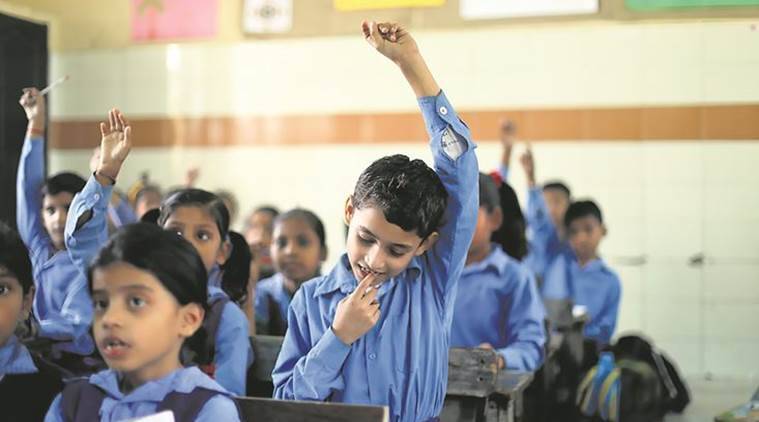Frontlist | Implementation of New Education Policy in our education system
Frontlist | Implementation of New Education Policy in our education systemon Oct 23, 2020

The Union cabinet in July 2020 approved the New Education Policy (NEP), which aims at universalization of education from pre-school to secondary level.
NEP-2020, which will replace the National Policy on Education-1986, is an inclusive framework focusing on the elementary-level of education to higher education in the country.
As the objective of any education system is to benefit children so that no child loses any opportunity to learn and excel because of circumstances of birth or background, NEP-20202 has a target of 100% Gross Enrolment Ratio (GEER), in school education by 2030.
The Policy reaffirms that bridging social gaps in access, participation, and learning outcomes in school education will continue to be one of the major goals of all education sector development programmes.
Many government and non-government surveys done in the last several years had hinted at the precarious state of ‘learning crisis’ in India. However, the true picture emerged after a National Achievement Survey (NAS) was undertaken by the National Council of Educational research and Training (NCERT), which was ably supported by the Union ministry of education.
The survey was aimed at understanding how effectively the school system is working in the country based on student learning. It was conducted across the country on November 13, 2017 for Classes III, V and VIII in government and government-aided schools. It was by far the largest assessment survey conducted in the country and is also one of the largest conducted in the world.
The findings stated that students across 12 states scored significantly below the national average in mathematics ability. NAS identifies learning as big challenge facing Indian education. The next few years are critical as India could lose 10 crore or more students because of learning losses and lead to illiteracy unless proper action is not taken soon.
Union minister of education Ramesh Pokhriyal said that the fundamental principles of NEP is to accord highest priority to achieving foundational literacy and numeracy by all students by Grade III, which the government is committed to achieving by 2025.
To translate this particular vision of NEP-2020, under the ‘Atmanirbhar Bharat’ programme, a National Initiative for Proficiency (NIP) in reading with Understanding and Numeracy (NIPUN—Bharat) will be soon launched. This mission will fulfill the learning needs of nearly five crore children in the age group of 3 to 11 years. The mission will also take a holistic approach and involve all stakeholders actively for achieving the goals.
NEP would transform the education sector in the country as it focuses on making education accessible, equitable, inclusive but only if implemented at all levels.
The main challenge is to implement the highly comprehensive NEP 2020. Before we talk about the implementation lets understand why any policy fails?
There can be four major contributors to policy failure
1.Overly optimistic expectations: Due to over optimism there is and under estimation of cost and time for a policy to be implemented.
2.Implementation in dispersed governance: When the policy is tailor made to fit all irrespective of their constraints.
3.Inadequate collaborative policymaking: Lack of collaboration with all the stakeholders
4.Vagaries of the political cycle: The policy makers concentrate on the short-term results as they don’t want to be tagged for the failure, and take credit of the legislation that is passed rather than its implementation.
Therefore, to implement the NEP 2020 we need to work upon a few major challenges.
Content, Curriculum & Pedagogy
The 10+2 structure of school curricula is to be replaced by a 5+3+3+4 curricular structure corresponding to ages 3-8, 8-11, 11-14, and 14-18 years respectively. The new system will have 12 years of schooling with three years of Anganwadi or pre-schooling.
To implement the changes at each level a thorough restructuring of the curriculum, pedagogy and the content needs to be done as per the NCF (National Curriculum Framework) and content rubrics needs to be revisited to modify the textbooks.
Blending of technology with the teaching and learning process
National Educational Alliance for Technology (NEAT) a regulatory body will be created to use technology for better learning outcomes. NEAT aims to use artificial Intelligence to make learning more personalized and customized as per the learner’s requirement. It even proposes to create national alliance with EdTech companies for a better learning experience.
But a big challenge here is establishing a robust digital infrastructure that even caters to the remote areas.
Assessment
The proposal to set up a national assessment centre, the PARAKH (Performance Assessment, Review, and Analysis of Knowledge for Holistic Development) is to keep a regular check on the education system. Strengthening Teaching-Learning and Results for States (STARS) project will include CERC (Contingency Emergency Response Component) will help the Government tackle the learning losses due to School closures or any such emergency that arise in the state.
NEP 2020 recognises now the need to evaluate “higher-order skills, such as analysis, critical thinking and conceptual clarity,” and hence shifting the focus of assessments from marks based to competency based. The marking system should now be different, there will be a dire need to change the questions so as they have related answers, where based on the child’s aptitude he answers and based on the answers the scores could be calculated.
Teachers training and availability
The NEP 2020 talks about creating higher performance standards for teachers clearly stating out the role of the teacher at different levels of expertise/stage and competencies required for that stage. Teachers will also have to be digitally trained to blend into the digital learning processes.
How to successfully implement the NEP
1.To implement NEP successfully at all levels the government will need to create stakeholder incentives so that the implementation is smooth and uniform.
2.Formulate instruments in the form of legal, policy, regulatory and institutional mechanisms
3.Build reliable information repositories
4.Develop adaptability across HEIs, regulatory bodies and government agencies
5.Develop credibility through transparent actions and participation of all stakeholders;
6.Develop sound principles of management
Schools will actually need to redefine the teaching and learning process for a proper implementation of NEP 2020 to actually witness a trajectory of transformation for a phenomenal outcome.
Schools need to focus on the literacy and numeracy skills inorder to get a remarkable metamorphosis in the reading, writing and speaking skills of the children up to Class III. Schools will have to revisit the strategies of teaching and learning.
*Emphasize on practical and experiential learning which will lead to instilling the 21st century skills of creativity and critical thinking in the children.
*There needs to be a tectonic shift in the pedagogical structure where the outcome of learning should not be based on the completion of course but on the understanding of the topic.
*The assessment as I said earlier needs a complete revamp. The assessment should not define a child in terms of marks but should be an outcome of a qualitative analysis of the child. As every child is different and the same question can be understood in numerous ways by the different children.
*There needs an integration of technology in education with component of digital literacy, scientific temper and computational thinking for a holistic learning experience of the students.
*Vocational or skill-based learning should also be included right from class VI.
*Teachers should be encouraged to be bilingual as study shows that children pick up different languages quickly in the early ages. Till Class V education can be imparted in mother tongue if feasible.
*There will be no hard discrimination between subjects and disciplines. Children will be encouraged to take multidisciplinary projects for better learning outcomes.
The NEP, which is designed to ease the burden of classroom teaching and examination on students, will play an important role in creating the future of the country. It’s success, however, lies in uniform and transparent implementation at all levels, with an equitable distribution of resources. This mammothic task can be realized only when there is a 100% cooperation and collaboration between the Central, State Government and the Ministry of Education.
(Author Dr Bijaya Kumar Sahoo is Founder and Chairman - SAI International Education Group, Advisor to Government of Odisha on implementation of NEP. View s expressed here are personal.)
Authors
Book fair 2020
Books
Coronavirus
Covid-19
Education Ministry
Frontlist Article
Frontlist Book News
Frontlist education News
Frontlist India news
Google news
HRD minister
HRD Ministry
Latest news
Ministry of Education of India
Narendra modi
NEP 2020
New Education Policy of India
New Education Policy of India 2020
PM
Prime Minister Modi
Ramesh Pokhriyal Nishank
Union Cabinet
Writers



.jpg)






.jpg)

.jpg)

.jpg)

.jpg)
.jpg)










Sorry! No comment found for this post.